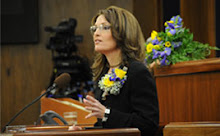I was amazed to read that the health care bill just passed in the House is deficit free. That's right. No worries. It's all paid for. Impressive, dontcha think? I set out to find out how this miracle transpired. I mean, the statement released by President Obama shortly thereafter the successful vote was clear. (emphasis mine)
The Affordable Health Care for America Act is a piece of legislation that will provide stability and security for Americans who have insurance; quality affordable options for those who don’t; and bring down the cost of health care for families, businesses, and the government while strengthening the financial health of Medicare. And it is legislation that is fully paid for and will reduce our long-term federal deficit.
Get out! Fully paid for?!
So, how did that happen? Well, first off, you kind of have to change around the grammatical tense of it all...because it isn't actually fully paid for yet. That's just a really, really big fat assumption. But more about that later.
The Congressional Budget Office, a self-proclaimed non-partisan organization that delves into financial issues surrounding bills that float around “the hill”, wrote a letter to Representative John D. Dingell (D-Michigan, dean of House) to give him the lowdown on the cost of H.R. 3962. It's posted online, and the White House administration is flaunting similar info found in the letter. Well, parts of it.
By the way, according to the NY Times, Rep. Dingell said yesterday,
“Today’s may be a tough vote, but it was in 1935 when we passed Social Security.”
Wow...now there's an awesome long term success story to compare this with.
Anyway, here's where some of the excitement comes in. The White House requests that you PAY NO ATTENTION to the last line. (sarc and emphasis mine)
According to CBO and JCT’s assessment, enacting H.R. 3962 would result in a net reduction in federal budget deficits of $109 billion over the 2010–2019 period. In the subsequent decade, the collective effect of its provisions would probably be slight reductions in federal budget deficits. Those estimates are all subject to substantial uncertainty.
Gee. It all seems so simple. What could lead to “substantial uncertainty”?
 Now, I'm not a statistician, but chances are, somewhere among those 2000 Pelosian pages, there lies a bit of...I don't know...Healthcare Lotto? Maybe we'll win...maybe we won't!
Now, I'm not a statistician, but chances are, somewhere among those 2000 Pelosian pages, there lies a bit of...I don't know...Healthcare Lotto? Maybe we'll win...maybe we won't!
In that same letter, the CBO lays out where the expenses lie.
Grand total over the ten years of 2010-2019 is $1,058 billion:
$1,052 billion in subsidies provided through the exchanges (and related spending),
increased net outlays for Medicaid and the Children’s Health Insurance Program (CHIP),
and tax credits for small employers
$6 billion in other effects on revenues and outlays associated with the coverage provisions
Starting the plan and financing it those ten years will be through “spending changes” (not specified), $167 billion in collections of penalties paid by individuals and employers (calculated punishments?), income tax surcharge on high-income individuals, plan premiums, and “other provisions” (not specified).
Keep in mind that the CBO also has pointed out that not every expense can be accounted for...there will be additional costs that other federal agencies will incur to handle the new program. The IRS and HHS will all need additional funds to function.
CBO has not completed a comprehensive estimate of the discretionary costs that would be associated with H.R. 3962, incorporating the manager’s amendment. Total costs would include those arising from the effects of H.R. 3962 on a variety of federal programs and agencies, as well as from a number of new and existing programs subject to future appropriations.
But really. We have nothing to worry about. It is “fully paid”. Whew. Oh, and don't worry about the years after 2019...that's when those "slight reductions", albeit substantially uncertain reductions, in the federal deficit kick in, and also...
The legislation would require that the premiums for the public plan be set to fully fund expenditures for medical claims, administrative costs, and a contingency reserve.
Hmmm. It does sound like it could get pricey later on.
But your state will help out...
New requirements in the Medicaid program also would result in an increase in state spending.
 I am reminded of Gov. Sarah Palin refusing certain stimulus funds offered to Alaska because of the far reaching (into the pockets) consequences of those programs started with said funds. Looking to the future, she saw our children furrowing their brow and swinging the hammer, not to build a home for themselves, but to pay off the debt being loaded onto their shoulders today.
I am reminded of Gov. Sarah Palin refusing certain stimulus funds offered to Alaska because of the far reaching (into the pockets) consequences of those programs started with said funds. Looking to the future, she saw our children furrowing their brow and swinging the hammer, not to build a home for themselves, but to pay off the debt being loaded onto their shoulders today.
She knew better. Our elected leaders should know better.
Our first president knew better. In his Farewell Address to our nation on September 19, 1796, President George Washington wrote words of encouragement and admonition. And ever since 1896, the longest standing annual Senate tradition of reading it out loud occurs around his birthday. I wish the Senators would pay attention. Consider this timely advice.
“...avoiding likewise the accumulation of debt, not only by shunning occasions of expense, but by vigorous exertions in time of peace to discharge the debts which unavoidable wars may have occasioned, not ungenerously throwing upon posterity the burden which we ourselves ought to bear.”
Ungenerously. Plain selfishness, in other words. My husband explains often in his sermons that the opposite of love is not hate. It is selfishness. Every immoral and unethical act can be anted up to selfishness.
Another excerpt from Washington's address gives every hint to me that what we are seeing among our elected leaders is selfishness.
It is important, likewise, that the habits of thinking in a free country should inspire caution in those entrusted with its administration to confine themselves within  their respective constitutional spheres, avoiding in the exercise of the powers of one department to encroach upon another. The spirit of encroachment tends to consolidate the powers of all the departments in one and thus to create, whatever the form of government, a real despotism.
their respective constitutional spheres, avoiding in the exercise of the powers of one department to encroach upon another. The spirit of encroachment tends to consolidate the powers of all the departments in one and thus to create, whatever the form of government, a real despotism.
They do not care what “We the People” want. They are creating a ridiculous number of positions for unelected czars, thereby erasing checks and balances; buying out private markets; and bowing at the feet of intimidation...thinking all of that will boost their own significance and ensure their future careers. But as Gov. Palin remarked just today, “Sunday's coming.”
How ironic that on the site of the White House Office of Management and Budget, a quote from President Obama is highlighted today,
“A budget is more than simply numbers on a page. It is a measure of how well we are living up to our obligations to ourselves and one another."
And yesterday? FromABCnews.com,
Obama reportedly told his fellow Democrats in that meeting that he knew they might face opposition from their constituents for this vote.
"It's tempting to say, 'I'm tired, it's hard, I'm getting beat up back in the district, it's just not worth it,'" Obama said, according to a source in the meeting. "If we do not get it done this year, we will not get it done anytime soon."
Huh! Just doesn't sound very obligatory, does it? Maybe that's why the House bill title page says, "...and for other purposes." Hmmm.
 Lotto image credit.
Lotto image credit.
HR title image credit.
Piggy bank image credit.
Washington image credit.
(Cross-posted at The Palination.)










































